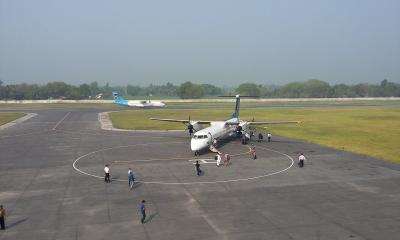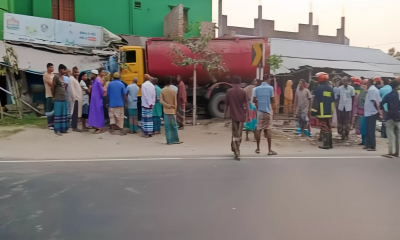Though gas crisis for residential consumers has reduced slightly, fertilizer producing heavy industries in the port city of Chattogram, considered as a business hub, have been grappling with it for the past nine days suspending production in the three major factories.
The factories are the state-owned Chittagong Urea Fertilizer Limited (CUFL), CUFL`s DAP-1, and DAP-2 units.
Though Chattogram-based Karnaphuli Fertilizer Company (KAFCO) had been out of production due to lack of gas supply for the past nine days, it returned to production on Saturday morning.
The Bangladesh Chemical Industries Corporation (BCIC) held the gas crisis and technical glitches in factories responsible for suspension of the production in the commercial city of the country.
It was learned that the technical faults in the Floating Storage and Regasification Unit (FSRU) at Maheshkhali in Cox`s Bazar suspended the gas supply to both residents and industries in the Chattogram on January 19.
Although residential gas supply resumed two days later, industrial factories continued to suffer from the gas crisis, compelling large industrial units to shut down production for the past nine days.
The authorities concerned asked the heavy industries to keep their productions shut until the gas supply normalises fully.
CUFL`s Managing Director Mizanur Rahman said the gas crisis forced them to halt production from the night of January 19. Before the closure, the CUFL used to produce 12,000 metric tonnes of urea fertilizer per day.
In the country, KAFCO and CUFL have been playing a major role in producing fertilizer. The KAFCO alone produces around 5.5 (0.55 million)lakh tonnes of fertilizer and supplies to various warehouses annually, he said.
The total demand for urea fertilizer in the country is 2.7 million tonnes, out of which 1 million tonnes are produced domestically while the rest is imported, the KAFCO officer informed.
He expressed optimism that once the gas supply returns to normal and maintenance work on the industrial machinery concludes, production will resume.
He emphasised that the situation would improve after resolving the gas pressure issue affecting heavy industrial units.
On the other hand, gas distributing Karnaphuli Gas Distribution Company Limited (KGDCL) defended them saying that initially the shutdown of KAFCO and CUFL factories was due to technical problems. Subsequently, production was affected due to the gas crisis. Once gas supply resumed, production faced interruptions again due to technical issues.
Despite the turmoil in the gas supply to the port city, KGDCL’s Managing Director Engineer Aminur Rahman claimed that there are no pressure-related problems. Gas is supplied regularly to general consumers, including industrial establishments, commercial entities, and households.
However, bulk consumers, such as power plants and fertilizer factories, receive limited gas supply as directed from above, he said.
The port city needs 30 to 32 billion cubic feet of gas per day while industrial factories alone require 8 to 10 billion cubic feet. However, due to the gas crisis, around two-thirds of this demand remains unmet.
According to the Directorate of Inspection for Factories and Establishments in Chattogram, except ceramics there are 4,949 registered factories in Chattogram,
Of them, 1,924 are textile factories and the rest are non-RMG (Ready-Made Garments) factories. The commercial hub also hosts 29 steel mills and eight cement factories. Production in these industries has been severely affected due to the gas supply disruption, resulting in substantial financial losses for factory owners.
According to the KGDCL, they have over 1,200 industrial customers. Among them are 15 to 20 major industries like BSRM, GPH Ispat, and many others, totaling .
Apart from these, the CUFL, KAFCO, and DAP fertilizer factories, and two power plants in Raozan and Sikalbaha are supplied with approximately 300 million cubic feet of gas daily by the government.
Beyond these, non-governmental industrial units and residential consumers have a daily gas demand of around 150 million cubic feet.
The gas situation has created a chaotic scenario for factories and industries in the Chattogram, impacting the industrial landscape of the region.
With the hope that gas supply normalizes and industrial machinery maintenance concludes, industry stakeholders are optimistic about an improvement in the overall situation.



































